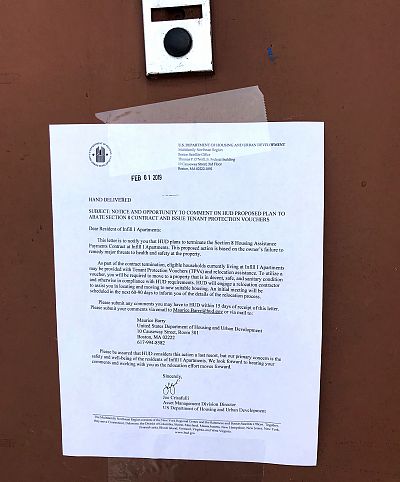"I'm so excited and shocked," said one tenant. Said another, "I am so happy, I was literally in the mall, crying."
WASHINGTON — Tenants of a troubled federally subsidized apartment complex in Hartford, Connecticut, were told Friday that the Department of Housing and Urban Development had canceled their landlord's contract and will move them to new homes.
The Infill Apartments were featured in a three-month NBC News investigation that found rats, mold, roaches and fire safety violations. On Friday, tenants awoke to discover notices on their doors saying HUD had terminated its contract with the landlord, Eli Fish, an action rarely taken by HUD officials.
"This letter is to notify you that HUD plans to terminate the Section 8 Housing Assistance Payments Contract at Infill I Apartments," said the notices, which placed the blame squarely on "the owner's failure to remedy major threats to health and safety at the property."
The move will not be immediate, but a relocation meeting should occur in 60 to 90 days. Reaction from tenants who had been interviewed in an NBC News investigation, which appeared online and on the air in November 2018, was swift and positive.
"We're thrilled. I'm excited, I'm relieved," said Sarah Wheeler, who has been living in the Infill Apartments with her husband, Walter. "The most exciting thing is moving into a place where there aren't rodents, where there aren't roaches, where there aren't bedbugs."
"I am extra excited! I don't know how to go about it," said Ashley Matos, who has been raising her two children in her Infill apartment.
Since the story aired, Matos had continued to battle Fish to get basic repairs. She said she has had no electricity in her two upstairs bedrooms for two months. To compensate, she said, she has been using extension cords from downstairs power outlets that she pulls up the stairs to power lights in the bedrooms. She said the bathtub stopped draining, leaving her to empty out the water into her toilet after every bath or shower. She says Fish has not responded to her multiple texts and phone calls and she has not seen him on the property since October.
Another Infill tenant, Tamesha Wright, told NBC News that after she heard the news she was "literally in the mall crying, I had to sit down. I have been going through this for a long time."
Eli Fish declined to comment during the original investigation and had no immediate comment Friday.
HUD's effort to cancel the contract was delayed 35 days due to the government shutdown.
Public records and conversations with HUD officials indicated Fish did not address known health and safety violations after taking over the property in 2016.
"This is justice long overdue for these tenants and it shows the power of residents organizing together," said activist Cori Mackey, who along with Rev. A.J. Johnson of the local Christian Activities Council organized the Infill tenants.
Mackey exercised caution, however, noting that HUD's managementof relocation of other tenants at other properties in Hartford has not been as smooth as tenants would want. "These residents have already suffered a lot of trauma and they have a right to a relocation process that affords them the right to make decisions about their future and not be forced into another bad situation," she said.
The NBC investigation showed that more than 1,000 out of HUD's nearly 28,000 federally subsidized multifamily properties failed their most recent inspection — a failure rate that is more than 30 percent higher than in 2016, according to an analysis of HUD records. The number of families living in those properties is 47,000.
HUD Secretary Ben Carson declined to be interviewed, but HUD responded to the findings in November with a statement. "The secretary believes very deeply that families should not be forced to live in housing that's unsafe or unhealthy and taxpayers shouldn't be subsidizing it," said HUD spokesperson Brian Sullivan.
Following the November story, HUD rolled out possible policy changes to improve the agency's inspection process. In a meeting with stakeholders, HUD indicated it was proposing to shorten the amount of notice a landlord would receive before an inspection. Currently, landlords are given three to four months to prepare. The new regulation would make the notice seven days or less.
The NBC News article showed another property close to the Infill apartments called Barbour Gardens that had scored a federal inspection score of 81 in February, 2018. A passing score is anything above 60. NBC documented holes in walls and mushrooms growing in the bathrooms of the apartment complex. HUD re-inspected that property after the NBC story and the new score was a 9.












